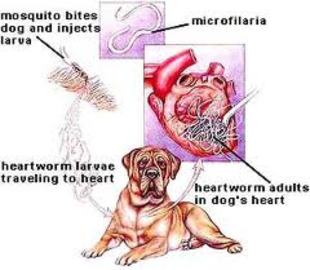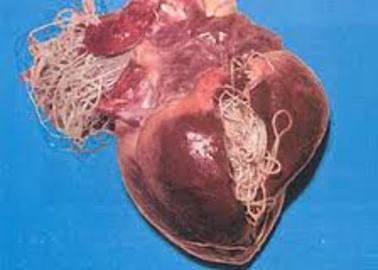Introduction

Immiticide is a FDA arsenic based approved drug that is used to treat heartworm disease. As the only FDA approved drug for the treatment of heartworms in dogs, it is not to be used on any other companion animal or for humane use. Immiticide treatment can only be administered by a veterinarian and is given as an injection into the deep lumbar muscle.
Step 1
In treating Heartworms in dogs, Immiticide is very effective and deemed safe, but it does have serious side effects. The most familiar side effect is the development of a thromboembolism, which is caused by the dead heartworms moving within the circulatory system. The stronger the infestation, the larger the risk for an embolus occurring. Other lesser side effects include injection site swelling and pain, lethargy, cough, lack of appetite and a fever.
Step 2
Immiticide treatment is usually given as two injections. The first injection is done right away, and the second injection is given 24 hours later. If the dog has a heavy case of heartworm, the vet will give a total of three injections. The first injection is given right away, and the second injection is given 30 days later, with the third injection 24 hours afterward. The reason for this is to allow the young heartworms to grow to adult hood, so they can be killed 30 days later.
Step 3
In order to lower the risk of an embolus, the dogs will be kept at the vet's office for the first few days of treatment, and limited to cage rest. Once the dog is home, their activity needs to be restricted for several weeks following the treatment. After treatment, an oral heartworm preventative must be given each month for the rest of the dog’s life.
It is common for a dog to have pain and/or swelling at the injection site of the Immiticide. Veterinarians will often send home an anti-inflammatory to help with the swelling and pain.
Step 4
Restlessness is another side effect of Immiticide. Your dog may pace back and forth or not be able to lie still for long. Once the treatment is over, this side effect will go away. If your dog is still restless after treatment, contact your vet, as there may be another condition causing the restlessness.
Step 5
Heartworms dig into the lining of the lungs, and this causes breathing problems. Since Immiticide is an arsenic compound, it is toxic to dogs and will also cause difficulty in breathing. Once the heartworms are killed off and the Immiticide is metabolized, breathing will return to normal. Dogs can also have a change of behavior because of the parasite load on the body. In addition to the parasites, the Immiticide can also cause changes in behavior. These behavior changes will disappear once the parasites are eliminated, and the Immiticide has metabolized.
As stated before, Immiticide is a compound made from arsenic and is a poison. When heartworm infections are caught early, the treatment side effects are mild. If heartworm infestation is severe, then organs have already been damaged by the parasites, and the treatment can cause further damage. Once the organs begin to fail, the change of survival is very low.
Tips

Heartworm disease can be prevented by following these recommendations:
- Have your veterinarian perform yearly heartworm blood tests.
- Give your dog heartworm preventative every month, no matter the season.
- Contact your veterinarian if your dog exhibits breathing issues, behavioral changes and restlessness.